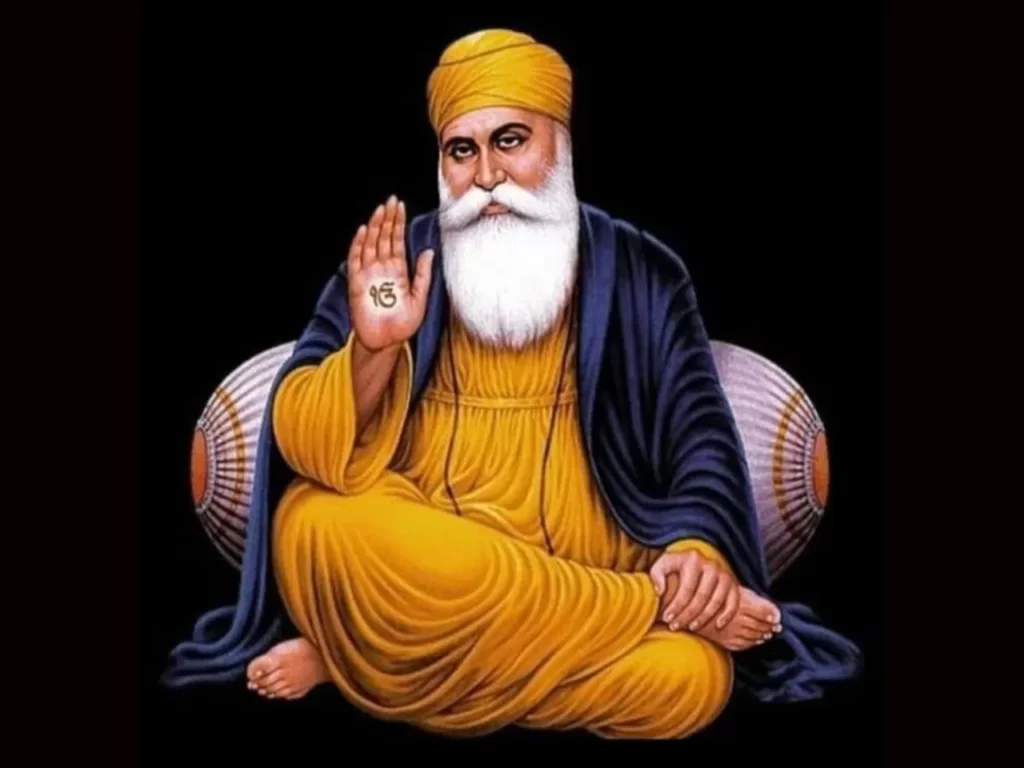
Guru Nanak Dev Ji – The Eternal Light of Truth & Compassion
Introduction
Guru Nanak Dev Ji (1469–1539), the first Guru and founder of Sikhism, remains one of the most profound spiritual teachers in world history. His life was not merely a sequence of events; it was a continuous flow of divine wisdom, compassion, and fearless truth-telling. In an era divided by caste hierarchies, religious tensions, and ritualistic practices, Guru Nanak brought forth a message so simple yet so revolutionary that it resonated across centuries: There is but One God, and all human beings are equal in His eyes.
To truly understand Guru Nanak Dev Ji is to walk through the lanes of his birthplace, to hear the soft rustling of the Kali Bein river where he attained enlightenment, and to follow the dusty roads he traveled during his four great journeys – each a living testament to his mission of universal brotherhood. This post will take you through his life in a detailed, story-like manner, so that even someone completely new to his legacy will walk away inspired, informed, and deeply moved.
“There is no Hindu, there is no Muslim – only human beings walking the path of the Divine.”
Birth & Early Life
Guru Nanak Dev Ji was born on 15 April 1469 in the small village of Rai Bhoi Ki Talwandi, now known as Nankana Sahib in present-day Pakistan. His father, Mehta Kalu, was a respected accountant in the local administration, while his mother, Mata Tripta, was a gentle and deeply spiritual woman. Nanak was the younger of two siblings; his elder sister, Bebe Nanaki, would play a crucial role in recognizing and nurturing his spiritual gifts from an early age.
The Punjab of the 15th century was a land of rich culture but also deep divisions. The society was fragmented along religious lines between Hindus and Muslims, and further within Hindu society by caste. Life was governed by rigid social norms, and the idea of questioning these was almost unthinkable. Yet, into this world came a child who would see beyond these man-made walls.
From his earliest years, Nanak was unlike other children. While his peers played games or quarreled over toys, he often sat quietly, observing nature — the flutter of leaves, the flow of rivers, the pattern of stars. He would ask his parents questions like, “Who made the sun?” or “Where do people go after they die?” — questions that hinted at a mind far beyond his age.
Key Facts at a Glance
- Birth Name: Nanak
- Birthplace: Nankana Sahib, Pakistan
- Parents: Mehta Kalu (father), Mata Tripta (mother)
- Siblings: Bebe Nanaki (elder sister)
- Birth Date: 15 April 1469
- Significance: Founder of Sikhism
Education and Early Signs of Wisdom
As was the custom, Nanak was sent to school at the age of seven. His teacher, Pandit Gopal, tried teaching him the basics of reading, writing, and arithmetic. But Nanak astonished him by asking, “What is the use of learning letters if we do not learn the truth they can convey?” This was not defiance — it was a child’s genuine quest for knowledge beyond the ordinary.
He mastered the local languages of Punjabi and Hindi, but he also learned Persian and Sanskrit, enabling him to read religious texts from both Hindu and Islamic traditions. This was rare for a child of his background and showed his openness to all forms of wisdom.
By his teenage years, Nanak was already respected in his community for his calm demeanor and thoughtful nature. He was not drawn to wealth or status, much to his father’s concern. Instead, he spent time in the company of saints, wandering mystics, and ordinary villagers, listening to their joys and sorrows with equal attention.
The Kali Bein River Enlightenment
At the age of 30, an event occurred that would change Nanak’s life forever. One morning, he went to bathe in the Kali Bein river near Sultanpur Lodhi. He entered the water and did not return for three days. The villagers feared he had drowned, and the news spread quickly. But on the third day, Nanak emerged, his face glowing with an otherworldly light.
When asked where he had been, he replied that he had been in the presence of God. The divine had spoken to him, giving him the mission to spread the message of truth. His first words upon returning were:
“Na koi Hindu, Na Musalman” – There is no Hindu, there is no Muslim, only followers of One God.
This was not a rejection of religions but a call to rise above divisions. He believed that God was beyond labels, forms, and rituals, and that the essence of faith was love, compassion, and humility.
Daily Life and Character
After his enlightenment, Guru Nanak lived a simple yet profound life. He wore plain clothes, ate modestly, and worked honestly to earn his living, often in service to others. He spent mornings in meditation, days in discourse with people of all walks of life, and evenings in kirtan (devotional singing).
Those who met him described him as calm but firm, gentle but fearless. He could sit with kings and beggars alike, never showing pride or prejudice. He used everyday examples — a potter shaping clay, a farmer sowing seeds — to explain deep spiritual truths in ways anyone could understand.
The Four Udasis – Guru Nanak’s Journeys
Guru Nanak spent nearly two decades traveling to spread his message, covering thousands of kilometers by foot. These journeys, called Udasis, took him to places where no one expected a saint to go. He visited Hindu temples, Muslim mosques, Buddhist monasteries, and markets, always engaging in dialogue rather than debate.
First Udasi (1499–1506)
Guru Nanak traveled eastwards through Delhi, Banaras, Assam, and Bengal. In each place, he observed local customs, often challenging superstitions and discriminatory practices. In Assam, he sang hymns by the Brahmaputra River, drawing crowds of both Hindus and Muslims.
Second Udasi (1506–1513)
This journey took him south to Sri Lanka. Stories tell of him meeting the king of Ceylon, where he spoke of the futility of material riches and the value of humility.
Third Udasi (1514–1519)
Guru Nanak headed north towards Tibet and Central Asia. In the cold mountain regions, he conversed with Buddhist monks about the nature of the soul and compassion.
Fourth Udasi (1519–1521)
His final long journey took him west to Mecca, Medina, and Baghdad. In Mecca, he is said to have gently corrected a qazi who questioned why he was lying with his feet towards the Kaaba, explaining that God is present in all directions.
Teachings & Philosophy
Guru Nanak’s philosophy can be summarized in three guiding principles, but their depth lies in how they were lived:
- Naam Japna: Meditate on God’s Name. For Guru Nanak, this was not mere repetition but a constant awareness of the Divine presence in every moment.
- Kirat Karni: Earn an honest living. He taught that spirituality does not mean renouncing the world; it means living truthfully within it.
- Vand Chakna: Share what you earn with others. This was the foundation of the Langar tradition, where all eat together as equals.
He rejected caste, ritualism, and blind faith, insisting instead on personal experience of the Divine through love and service.
Establishment of Kartarpur Sahib
In 1519, Guru Nanak founded the town of Kartarpur on the banks of the Ravi River. Here, he lived with his family and followers, creating a model community based on equality, honest work, and spiritual devotion. The first Langar (community kitchen) was established here, where rich and poor, men and women, all sat in a single line to share a meal.
Kartarpur became a living example of his teachings, with farming, singing of hymns, and service to the needy as daily practices. People from far and wide came not only to learn from Guru Nanak but to experience the harmony of the community he had built.
Last Years & Eternal Legacy
In his final years, Guru Nanak appointed Bhai Lehna as his successor, naming him Guru Angad Dev Ji. On 22 September 1539, Guru Nanak left his physical body. A dispute arose between Hindus and Muslims over whether to cremate or bury him, but legend says that when they lifted the sheet covering his body, only flowers remained — which both groups divided and honored according to their traditions.
His hymns, preserved in the Guru Granth Sahib, continue to guide millions. His birthday, celebrated as Gurpurab, is one of the most significant events in Sikhism, marked by kirtan, processions, and acts of service.
Key Life Timeline
| Year | Event |
|---|---|
| 1469 | Birth at Nankana Sahib |
| 1499 | Spiritual awakening after Kali Bein experience |
| 1499–1521 | Four Udasis (extensive travels) |
| 1519 | Establishment of Kartarpur Sahib |
| 1539 | Guru Nanak Dev Ji’s merger with the Divine |
